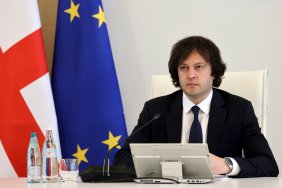Twenty-three non-governmental organizations operating in Georgia on Thursday responded to the European Council session held on June 27, which brought together the leaders of the 27 member states of the bloc and condemned Tbilisi’s recent adoption of the controversial foreign influence transparency law as impediment on the country’s EU path.
In their statement, the NGOs highlighted that the European Council expressed “serious concerns” over recent developments and “democratic regression” in Georgia.
"The leaders of the EU member states have assessed that the adoption of the ‘Russian law’ represents a significant setback in fulfilling the nine steps outlined by the European Commission last year [for opening accession talks with Tbilisi]. Completing these steps, along with adhering to European values, is a prerequisite for commencing negotiations on Georgia's accession to the European Union”, the signatories said.
They added the European Council had urged the Georgian authorities to change their current course, warning that it jeopardized Georgia's EU path and could result in a de facto suspension of the accession process.
“Additionally, the Council called on the Georgian authorities to ensure free and fair elections in the fall of 2024 and to end physical attacks, intimidation, and threats against civil society representatives, political leaders, activists, and journalists," the statement reads.
The NGOs said they believed the threat of freezing Georgia's EU accession process was real, as confirmed by statements from high-ranking EU officials and member states and called on the government to repeal the so-called Russian law and other legislative initiatives that contradicted the fundamental principles and values of the European Union, respect the will of the vast majority of Georgian citizens to join the European family and preserve the achievements made on the path to European integration and follow the nine steps outlined by the European Commission.
The NGOs included Georgia’s Reforms Associates (GRASS, Eastern European Center for Multiparty Democracy, Democracy Research Institute (DRI), Tbilisi Pride, Institute for the Development of Freedom of Information, Green Alternative, ISFED and others.
In December 2023, Georgia received candidate status for the European Union, with nine steps defined for initiating accession negotiations.






